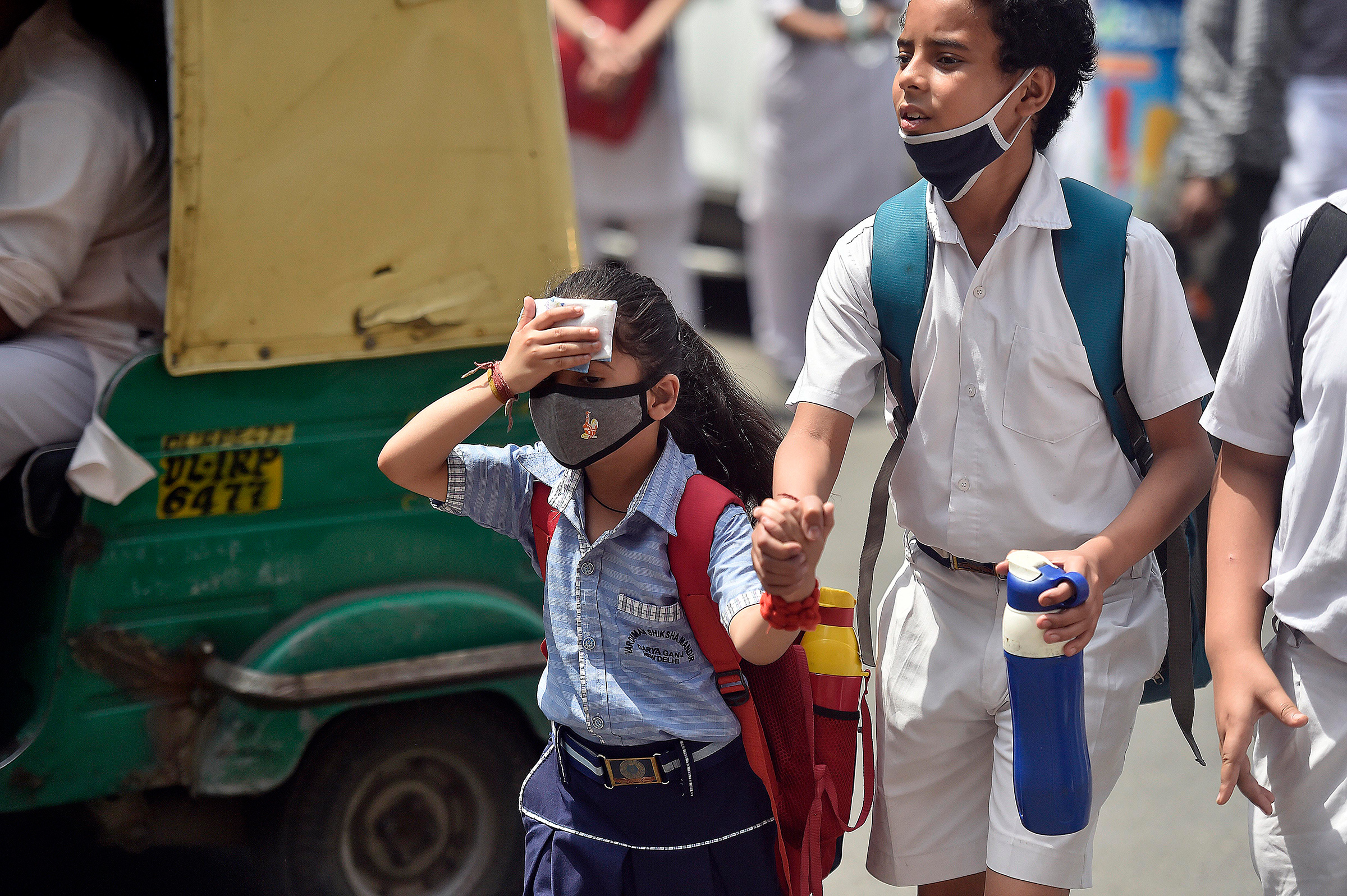
School’s about to be out for the summer in India—weeks earlier than planned. The sweltering spring heatwave that has built across the subcontinent since March has in recent days forced several north Indian states to change schooling hours, revive lockdown-era online classes, and bring forward annual summer vacations.
Air conditioning is rare in Indian schools—a selling point for the few that offer it—and heat-related power outages have left classrooms unable to run electric fans. Teachers in Gurgaon, a city near Delhi, reported students fainting during lessons. Students in Kolkata complained they were unable to focus during exams. On April 29, the government in Punjab, a northern state where temperatures reached nearly 115°F this week, said that it will send students home on May 16 for two weeks of online classes. Until then, school hours are shifting forward, so that students can learn from 7 a.m. to 12.30 p.m., and return home for the hottest part of the day. The states of Chhattisgarth and Haryana announced similar plans.
Shutdowns like these save lives in India. The country is no stranger to extreme heat, and authorities rely on monitoring and warning systems to prevent people from exerting themselves when temperatures get dangerously high. And states have brought forward school holidays in the past.
But with severe heat waves now regularly arriving weeks before the official start of summer, and after two years of COVID-19 closures that severely disrupted Indian children’s education, some teachers say the country needs to do more to make its schools resilient to climate change. Gurbachan Singh, a Punjab-based math teacher and representative for educators union the Democratic Teachers Front (DTF), accused the state of resorting to “easy shortcuts,” by shutting down schools. “The government should give priority to holding regular classes and giving the schools proper power supply and weather-appropriate infrastructure instead of shutting them down,” Singh told the Times of India on Wednesday.
India is not the only country where weather extremes pose a challenge for schools. “Climate change is increasingly having a very real impact on children’s opportunity to learn globally,” says Robert Jenkins, UNICEF’s director of education. “We in the education sector are waking up too late to this challenge.”
In a 2020 survey by UNICEF of 25,000 students in eight South Asian countries, 78% said climate change had impacted their education: 5% said climate impacts made their school unsafe, 19% said their journeys to school had been affected, and 25% said heat or flooding had left them unable to concentrate or forced them to drop out of classes. Heat is not the only culprit: in 2017, Vietnam had to close more than 325 schools in four provinces for nine days after a cyclone, and in 2015, a typhoon in the Philippines shuttered 803 schools for two weeks. The Global North is not immune either. In the U.S., almost one in five students attended school districts that suffered federally-declared natural disasters between 2017 and 2019. Such events are now happening “with an increasing frequency, for a longer duration and over broader areas,” Jenkins says.
The long-term implications for countries on the frontlines of climate change is worrying. A 2019 study by U.S. nonprofit, the National Bureau of Economic Research, found that students in hotter countries performed worse than those in cooler countries on international standardized math tests. Within the U.S., researchers found a 1°F increase in the average temperature over a school year decreases test scores by 0.002 standard deviations—the equivalent of just under 1% of a year’s worth of learning. It’s hard to quantify the economic impact of climate change on education systems, which includes everything from the cost of repairing damaged infrastructure to the knock-on effects on students’ future livelihoods, but the U.N. estimates the number is “likely to be in the scale of trillions of dollars.”
Despite that, governments have been slow to address threats to education as part of their climate plans, Jenkins says. In the short term, UNICEF is working with 145,000 schools in India on programs to share information about ways to stay safe while learning, and helping northern states to create heat action plans, which help schools determine risk levels at different temperatures. Some cities offer pamphlets on heat risks for schools to send home to parents.
But those steps only go so far. To keep children learning, many schools urgently need large-scale infrastructure improvements, Jenkins says, such as increased access to drinking water and sanitation, which is still lacking in large parts of rural India. Newly built schools need to be designed to be climate resilient—on stilts if they are in flood-prone areas, and with climate-specific architecture to mitigate heat risks.
COVID-19 lockdowns have given many schools experience in running lessons remotely, but in Punjab, teachers’ unions have urged the government not to view online classes as a long-term solution to rising heatwaves. They cited lasting “steep declines” in student engagement due to “ineffective online classes,” and warned of a lack of access to internet and devices in low-income homes.
Jenkins agrees that school closures “should be avoided at all times.” That’s not only because of the risk of deepening educational inequalities, he argues, but also because schools, as the main way children and parents interact with local government in many parts of the world, can be a crucial platform for sharing information about safety precautions during climate disasters. “Schools can be a really positive influence during those times, because children can engage their parents and their communities in the best way to deal with climate change.”
More Must-Reads from TIME
- Inside Elon Musk’s War on Washington
- Why Do More Young Adults Have Cancer?
- Colman Domingo Leads With Radical Love
- 11 New Books to Read in February
- How to Get Better at Doing Things Alone
- Cecily Strong on Goober the Clown
- Column: The Rise of America’s Broligarchy
- Introducing the 2025 Closers
Write to Ciara Nugent at ciara.nugent@time.com